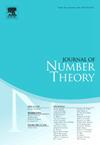Consecutive runs of sums of two squares
IF 0.6
3区 数学
Q3 MATHEMATICS
引用次数: 0
Abstract
We study the distribution of consecutive sums of two squares in arithmetic progressions. If is the sequence of sums of two squares in increasing order, we show that for any modulus q and any congruence classes which are admissible in the sense that there are solutions to , there exist infinitely many n with , for . We also show that for any , there exist infinitely many n with for and for .
两个平方之和的连续运行
我们研究算术级数中连续两个平方之和的分布。如果 是按递增顺序排列的两个正方形之和的序列,我们证明,对于任意模和任意同余类,它们在有解的意义上都是可接受的,存在无限多的有 ,为 。我们还证明,对于任何 ,都存在无数个与 为 和 为 .
本文章由计算机程序翻译,如有差异,请以英文原文为准。
求助全文
约1分钟内获得全文
求助全文
来源期刊

Journal of Number Theory
数学-数学
CiteScore
1.30
自引率
14.30%
发文量
122
审稿时长
16 weeks
期刊介绍:
The Journal of Number Theory (JNT) features selected research articles that represent the broad spectrum of interest in contemporary number theory and allied areas. A valuable resource for mathematicians, the journal provides an international forum for the publication of original research in this field.
The Journal of Number Theory is encouraging submissions of quality, long articles where most or all of the technical details are included. The journal now considers and welcomes also papers in Computational Number Theory.
Starting in May 2019, JNT will have a new format with 3 sections:
JNT Prime targets (possibly very long with complete proofs) high impact papers. Articles published in this section will be granted 1 year promotional open access.
JNT General Section is for shorter papers. We particularly encourage submission from junior researchers. Every attempt will be made to expedite the review process for such submissions.
Computational JNT . This section aims to provide a forum to disseminate contributions which make significant use of computer calculations to derive novel number theoretic results. There will be an online repository where supplementary codes and data can be stored.
 求助内容:
求助内容: 应助结果提醒方式:
应助结果提醒方式:


